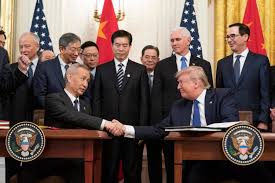U.S. Initiates Trade Tariffs on Major Partners, Sparking Global Economic Tensions

Washington, D.C. — In a move that has sent shockwaves through global markets, U.S. President Donald Trump has imposed significant new tariffs on the country’s three largest trading partners—Canada, Mexico, and China. The decision, which includes a 25% tariff on imports from Canada and Mexico and a 10% tariff on Chinese goods, marks a dramatic escalation in trade tensions that could have widespread economic consequences.
The tariffs, announced during a White House press briefing, are part of Trump’s broader “America First” economic agenda, aimed at reducing the U.S. trade deficit and protecting domestic industries. However, the move has already drawn sharp criticism from affected nations and global economic leaders, warning of potential retaliatory measures that could lead to a new wave of trade wars.
A Move to Protect U.S. Industry or a Political Strategy?
President Trump defended the tariffs, stating they were necessary to level the playing field and protect American manufacturing jobs.
“For too long, we’ve allowed other nations to take advantage of the United States. These tariffs ensure that American workers come first,” Trump declared.
The tariffs on Canada and Mexico, in particular, have sparked concern given their deep economic ties with the U.S. under the United States-Mexico-Canada Agreement (USMCA). Many fear that this move could strain diplomatic relations and hurt businesses dependent on cross-border trade.
China, which has long been at the center of U.S. tariff disputes, responded swiftly, calling the decision “unjustified economic aggression.” The Chinese government warned that it would retaliate with its own tariffs, potentially affecting American agricultural exports and technology industries.
Market Reactions and Economic Impact
The financial markets responded negatively to the announcement, with the Dow Jones Industrial Average dropping over 500 points in early trading. Investors fear that higher import costs could drive up inflation, increasing prices for American consumers while disrupting global supply chains.
Economists have warned that U.S. manufacturers reliant on imported materials—such as steel and electronics—could face rising production costs, potentially leading to job losses instead of job creation.
“Tariffs are essentially taxes on consumers,” said Mark Zandi, chief economist at Moody’s Analytics. “While they may provide short-term benefits to select industries, the long-term consequences could be damaging to economic growth.”



